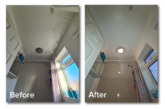
Matthew Warburton, Policy Advisor at the Association for Retained Council Housing (ARCH), discusses the possibility of one Ombudsman for all tenants.
Spurred in part by evidence that tenants’ concerns were ignored before the conflagration that claimed 71 lives at Grenfell Tower, the Government has recently finished consulting on proposals to strengthen consumer redress in housing. These centre on the option of a single Ombudsman for all housing issues, accessible by tenants and leaseholders of both private and social landlords, as well as owners of newly-constructed homes in dispute with their builders.
At present, housing is only partly covered by a patchwork of redress schemes of varying status, powers and effectiveness. If landlord fails to respond satisfactorily to their complaints, tenants of local authorities and housing associations can go to the Housing Ombudsman. Customers of letting and managing agents in the private rented and leasehold sectors can take a complaint to one of three redress schemes; but where the landlord does not employ a managing agent, there may be no redress scheme available.
A small number of private landlords have chosen to join the Housing Ombudsman scheme or one of the three private redress schemes; most have not. The Government is committed to require all private landlords to join a redress scheme; the consultation covered some of the detailed arrangements for putting that into effect. Where a redress scheme is not available, there is often no alternative but costly and time-consuming court action.
Single redress scheme
The consultation suggested a range of options, including a single redress scheme for the private rented sector with the Housing Ombudsman continuing to serve social tenants, and a single front door to separate schemes for private and social tenants. The most radical proposal, which seems to be the Government’s preferred option, is a single Ombudsman for all housing issues.
This could be available to all tenants and leaseholder, where private or social, and could also include owners of recently-bought homes in dispute with the seller. This might be confined to newly-built homes, which are normally covered by an industry-led warranty scheme which can offer resolution when things go wrong, but which do not always cover all issues. But the consultation paper also asks whether it should be extended to purchasers of second-hand homes.
There is a lot to be said for a single Ombudsman. Consumers would have much less difficulty knowing where to go if their complaints are not met; there could be a consistent approach, and the Ombudsman could develop expertise to be deployed across all sectors — after all, housing management and maintenance issues are largely common to private and public housing.
Overcoming challenges
The main challenge in implementing this approach is that the majority of private landlords own only a few homes, often just one. This makes it difficult to ensure that all landlords are aware of their responsibilities and to enforce participation. It may be necessary to amend legislation to include participation among the standard clauses of any assured tenancy. It is feasible, but less essential, that the single scheme should also extend to homebuyers.
The consultation also asks how the scheme should be paid for. The Housing Ombudsman is currently funded through subscriptions paid by (mostly) social landlords in proportion to the number of homes they own.
Some local authorities are unhappy about this, arguing that councils with robust local complaints schemes are subsidising others because fewer of their tenants need to take complaints to the Ombudsman. They would prefer a pay-per-complaint fee that incentivises prompt local action to deal with complaints. This might also work better for private landlords, many of whom would otherwise pay for a service their tenants would never use.








